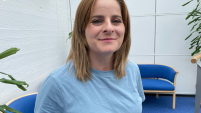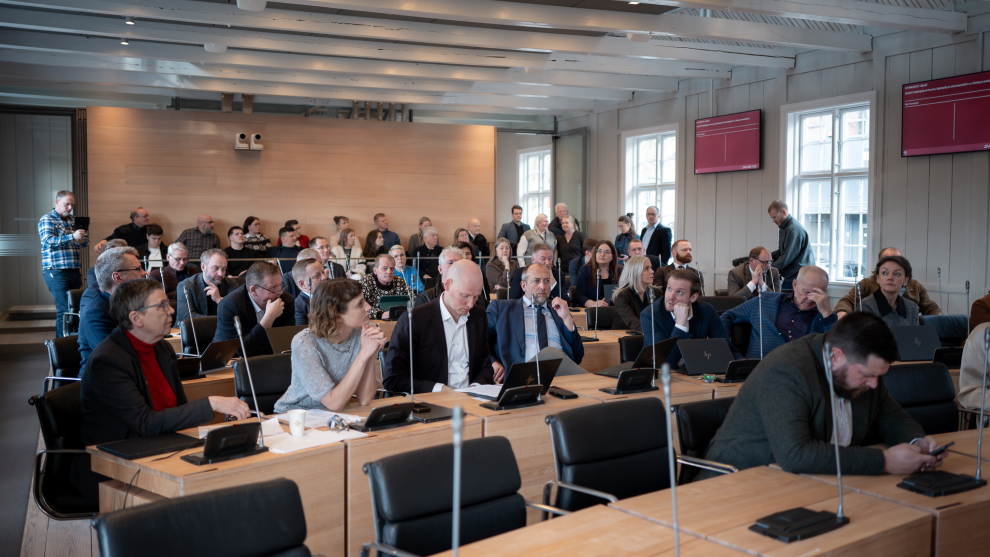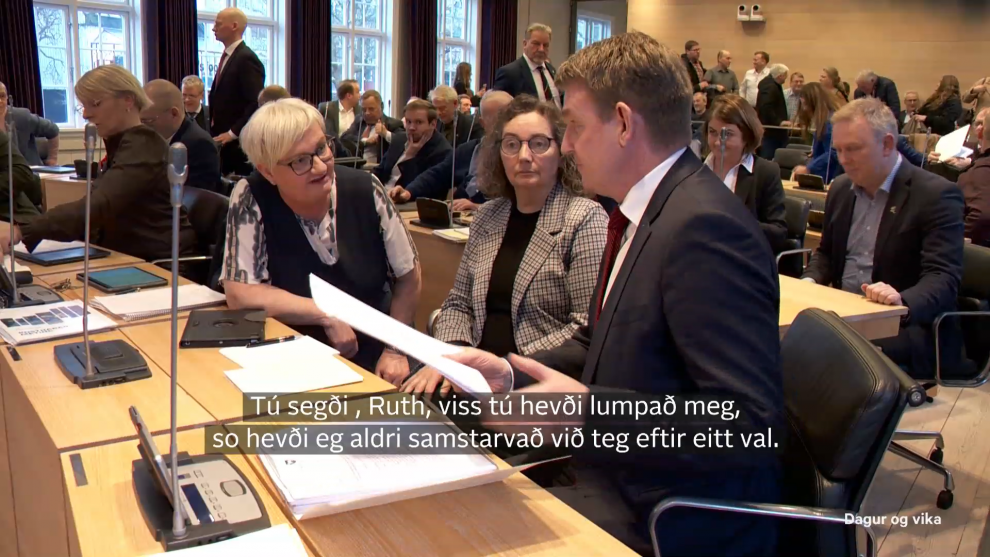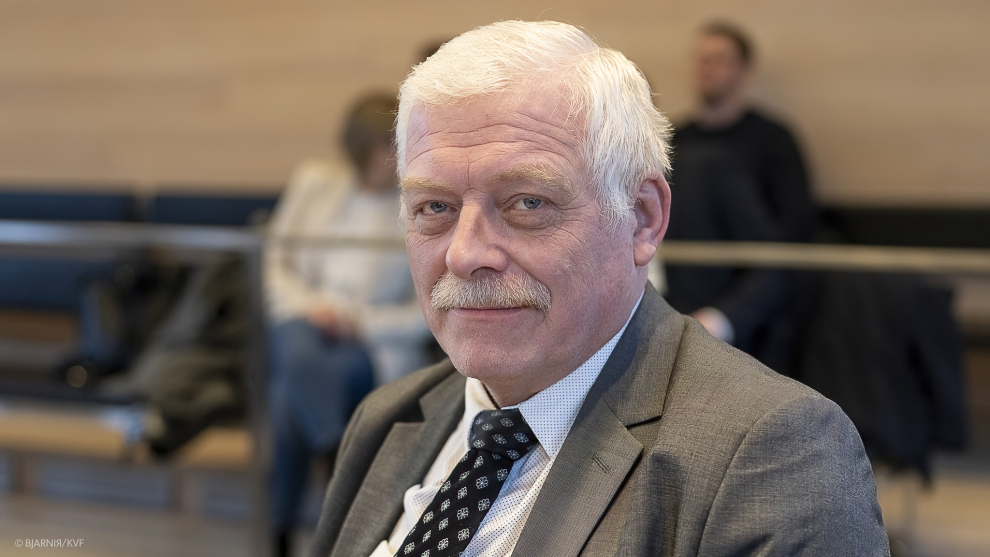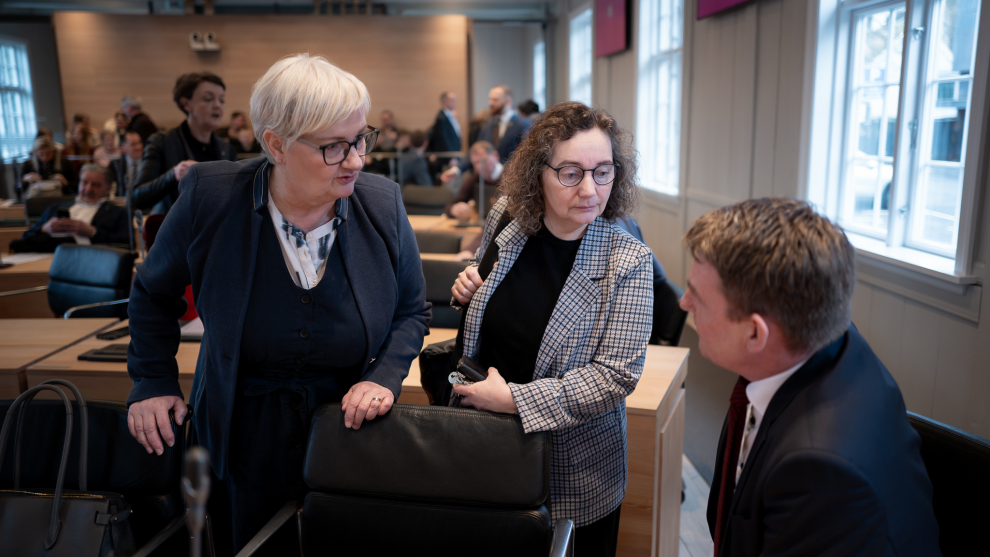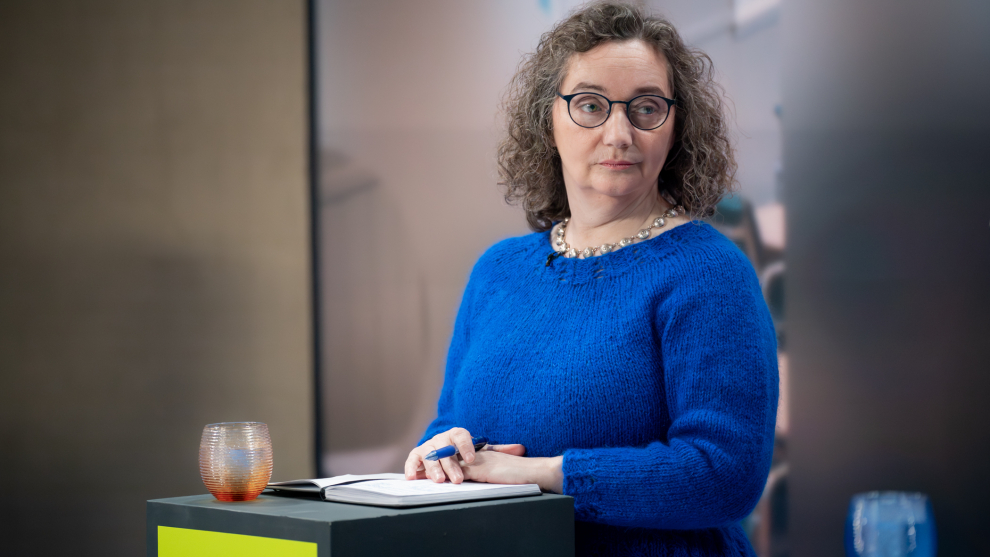- Tíðindi, mentan og ítróttur
Q&A on partial reopening of schools/daycare
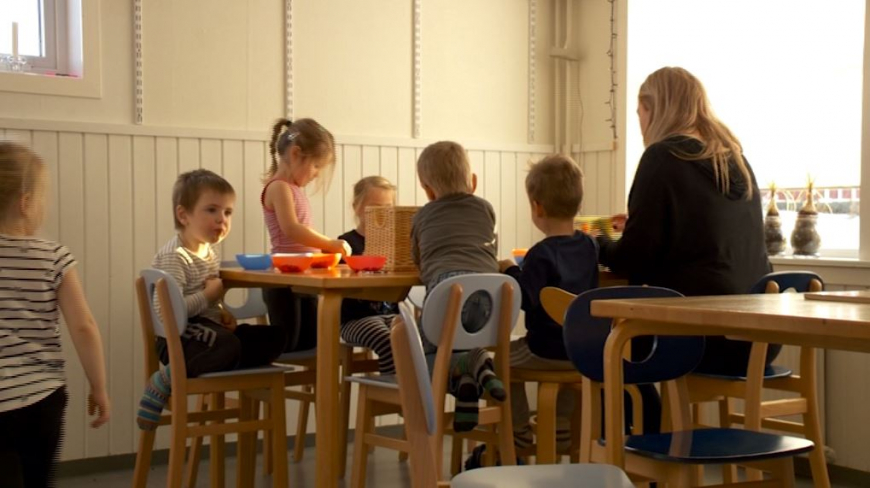
KvF yesterday broadcast a programme consisting of a call-in Q&A about procedures regarding Monday's partial reopenings of schools and daycare centres.
Answering the questions was one of the key people behind the new corona consultancy service for workplaces, Pál Weihe, chief physician at the Department of Occupational and Public Health.
EG: It is very uncomfortable to see that politicians say one thing and medical experts say another thing. This has caused great doubts for many parents. Should I now feel bad about sending my children to daycare on Monday? How important is it to keep them at home whenever possible?
Pál Weihe: It is not at all unusual to see disagreements among medical professionals. Personally, I think this is the right moment for a partial reopening of schools and daycare centres, but I am astutely aware that I might be wrong. I don’t think you should feel bad either way, whether you send your children to school/daycare or whether you choose to keep them at home.
-
Gogga: I work in a daycare centre. I share a house with a 90-year-old. How should I proceed?
Pál Weihe: In my view, living with a 90-year-old is in itself not a particularly strong reason not to go to work. If your housemate doesn’t have any of the illnesses commonly believed to make a person extra vulnerable to COVID-19, this person is unlikely to be more at risk than anyone else.
-
Randi: Shouldn’t the schools use as few teachers as possible? Adults can also carry the virus.
Pál Weihe: Yes, there should be as few teachers as possible, and they should also maintain a suitable distance from the pupils.
-
Concerned mother: I am very uncomfortable with the idea of sending my children to daycare in this situation. My older child, aged three, is always ill, with constant tummy troubles and has frequent fevers.
Pál Weihe: With the current strict measures to prevent virus transmission in place everywhere, not least in daycare centres, the likelihood of contracting the usual viruses such as flu is much lower than usual. Unless your child has a special underlying reason for the frequent fevers, it should be safe to send them to daycare.
-
School principal: If a pupils’ parents work abroad, then come to the Faroes and go into self-quarantine, should this pupil come to school during this 14-day quarantine period?
Pál Weihe: Yes, I would say so.
-
Mother in risk group: Is it advisable that I travel abroad for a wedding in late May?
Pál Weihe: You are more likely to contract the coronavirus abroad than in the Faroes, and you are required to go into a 14-day home quarantine once you return.
-
A mother: My daughter is 28 weeks pregnant. She works in a grocery store, and I worry a lot about her health these days. Her doctor has told her to continue working “as normal”. What do you think?
Pál Weihe: If she works at the till and comes into contact with many people, the risk of infection is relatively high. Danish health authorities state that pregnant women from week 28 or later should be given the option of working from home. If this is not possible, they have a right to sick leave for the remainder of the pregnancy period.
-
Barbara: It is possible for me to keep my children at home. What would you recommend?
Pál Weihe: If the children are healthy, I would suggest you let them go to school or daycare because being with other children is an important element of a child’s mental health and well-being. On the other hand, if you can provide home schooling for them, staying home is also an option. It’s really up to you.
-
Johanna: I am a teacher with diabetes 2. Are there any specific precautions I should keep in mind, or is it enough to follow the general prevention guidelines from the health authorities?
Pál Weihe: It enough to follow the general prevention guidelines from the health authorities even if you have diabetes 2.
-
Sigga: Are there any specific plans in place for children going into daycare for the first time? My child is due to start in a day nursery on 1 May. Is it safe?
Pál Weihe: There is a need for clear plans on this. To my knowledge, these plans have not yet been completed.
-
Signina: Are there any concrete plans to protect children, teachers, pedagogues, etc. with safety equipment such as masks, or is the plan to get everyone infected as soon as possible?
Pál Weihe: The plan is to avoid infection entirely. There is no plan to use masks or any other special protection equipment other than soap and common sense.
-
Læars: When children are said to be sturdy enough to re-enter society, doesn’t that reduce teachers and pedagogues to mere pawns in the whole chess game?
Pál Weihe: We all play our part in society, and sometimes going to work involves taking on slightly higher risks than if we stayed home.
-
Maria Joensen: What about school buses? Other bus and coach services have strict limitations on passenger numbers. Will this also apply to school buses?
Pál Weihe: We should stick to the guidelines regarding keeping a distance of two metres to the person next to us. Buses should not be filled schoolchildren. This may mean that many parents will need to drive their children to school/daycare or that buses will need to do run more frequently.
-
Maria: Should the children go into daycare if the parents are in a corona risk group?
Pál Weihe: Yes. The risk is so low after all that it is safe for the children to go into daycare or school. But it depends on which risk group the parents fall into. If, for instance, a parent has undergone an organ transplant, it might become necessary to completely isolate them, also from their children. If they fall into one of the less critical risk groups, it is most likely safe for the children to go to school/daycare.
-
Mother: My oldest child is in a risk group due to illness. Is it safe for my younger children to go into daycare?
Pál Weihe: There is no clear-cut yes/no answer here, but I would imagine that it is relatively safe for them to go.
-
A concerned dad: Our nine-year old daughter suffers from cystic fibrosis. Does she fall into a risk group? Should we send her to school?
Pál Weihe: Cystic fibrosis is one of the diseases regarded as a risk in relation to COVID-19. I advise you to consult with your GP.
-
Mother: Are there any considerations about the psychological consequences of the social distancing in schools and daycare centres?
Pál Weihe: Social distancing will be a key element in schools and daycare centres. No formal studies have been conducted on the psychological consequences of social distancing here in the Faroes. But a study has just started to investigate this in the public space, but obviously no data is yet available in schools or daycare centres because these have been closed.
-
A nurse: I am a mother working as a nurse at the National Hospital. We have some strict corona-related restrictions to adhere to at the hospital, some of which are not very compatible with my son starting in school. Is it safe to let him go to school?
Pál Weihe: Yes, it is safe to let him go to school.
-
Per: What are the odds that we will need to reverse the partially lifted restrictions in 3-4 weeks’ time if it turns out that we “opened up” too early?
Pál Weihe: I reckon it’s a low risk, but it’s impossible to put a figure on it. The crucial element here is that all members of the public practice extreme care and act with the same degree of responsibility as if the virus was still active in our society. For example, if a restaurant opens up again, that doesn’t mean that you can go out with many of your friends and wine and dine as if everything was normal. We should always keep in mind that this is a gradual reopening of our society.
-
Man in biomedical treatment: I have a weakened immune system due to biomedical treatment. Is it not safer for me to just stay home? And if, in my current situation, I become infected, will I automatically be hit harder than if my immune system were normal? Or is it possible to “escape” with mild symptoms?
Pál Weihe: We don’t know this for sure at this time. But it is generally agreed that a weak immune system increases the risk of becoming ill.
-
Mother: Our children have special needs and weak immune systems. Is it right to send them back to school? They do not understand the concepts of social distancing and hygiene.
Pál Weihe: It depends on how weak their immune system is. The Danish Paediatric Society has compiled a list specifying illnesses that put children at increased risk of contracting COVID-19. Faroese GPs have this list, and you should check with your local GP, who will be able to give you a clearer answer to your question.
-
Ólavur: When do you expect that bars and restaurants will open again?
Pál Weihe: I am hopeful that if the good trend we’re seeing now lasts over the summer, then we will have an almost normal society in early autumn. We should of course keep all the guidelines on hygiene and distance in mind and practice common sense. Our borders will, however, remain a problem for some time to come.
-
Mother: My one-year-old son has asthma and is taking Flixotide mornings and evenings. Is it safe to send him to the day nursery?
Pál Weihe: If is asthma is being treated properly, it should be safe, yes.
-
Anna: Our daycare centre has a meal system in which children are given bread and cold cuts on a shared platter so they can make their own sandwiches. Do we need to change this procedure?
Pál Weihe: Schools and daycare centres will be receiving guidelines from the health authorities shortly. I would personally discourage the use of shared platters.
-
Larsina: Why don’t we just close our borders completely?? Or at least introduce compulsory quarantine for all incoming travellers? That way we could open up our society entirely once the number of active corona cases has reached zero.
Pál Weihe: We have been relying on incoming travellers to respect our recommendations of a 14-day voluntary quarantine. If it turns out that these recommendations are not followed and we find examples of incoming travellers reintroducing the virus into our society, I agree that our authorities should consider introducing compulsory quarantine. Incoming travellers are a key hazard now that we are gradually easing our restrictions.
-
Annilena: Our hospitals, old people’s homes, schools, etc. have staff that are over the retirement age. Why aren’t these people sent home by their employers, as they are in the main risk group?
Pál Weihe: Sending these people home just because they are over the so-called retirement age would amount to ageism. Unless they have some serious illness or handicap, the additional risk they face, compared to younger people, is very small. I myself am over 70, healthy and I go to work every day.
-
Mother: I am in a dilemma: my son really wants to go back to school so he can see his friends again, which is perfectly understandable. But I work in elderly care, and I dread the thought of being the one who brings the virus into the elderly care sector as a result of the children going to school too early. What should I do?
Pál Weihe: This is very a common concern these days. We all need to live with a certain degree of risk now that we are slowly reopening parts of our society. Sending your son to school is not without its risk, but the risk is relatively low.
-
Anja: What about children with certain special needs? I am particularly referring a child’s hands and fingers frequently being put into the mouth, which means there is a great risk of mucous and saliva being spread all around the place. How should I go about caring for this child?
Pál Weihe: This is a challenge. It is not possible or advisable to prevent the child from playing and behaving in a way that feels natural to him or her. The best you can do is try to keep the infection sources to a minimum. To the degree possible, keep the child away from strangers. But also try to make sure that the child does not become isolated, as this would have a detrimental effect on his/her well-being. Try to maintain general hygiene and keep the contact to other people to a minimum.
-
Jóngerð: My in-laws live in my family’s basement flat. The two floors are connected by an indoor staircase, and we share a laundry room and a clothesline. The children visit downstairs several times a day. Their grandparents are over 70 years old. The children will now go to school, and my husband and I are in full-time employment. Should we start practicing social distancing with my in-laws on Monday?
Pál Weihe: As the children, parents and grandparents live under the same roof, the children can freely visit their grandparents as long as the grandparents are not in any special risk group, ie. don’t have any diseases that put them at increased risk of contracting COVID-19.
Translated by prosa.fo







